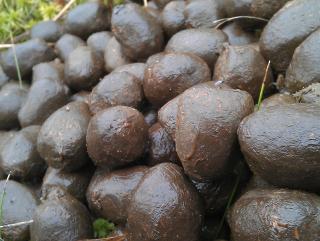I’m not a camper; I’ve slept outside five times in my life. Four of those times it rained. While that was uncomfortable, no one tricked me into eating moose poop (that I know of). 
According to CBC (that’s a network in Canada) multiple students on a school camping trip were offered what they thought were chocolate-covered almonds by an adult chaperone – which turned out to be moose poop nuggets. Things got worse when some of the students actually ate the turds while a school staff member and the principal watched. Dumb.
"I put it in my mouth and I took a bite out of it. And then everyone laughed," Brook, 14, said Friday. "Everyone laughed at me and made fun of me. So I went up to my tent and started crying."
Principal Bob Kovachik, a teacher and a resource officer at Walter Whyte School in Grand Marais, Man., watched as an adult chaperone passed off the moose droppings as chocolate-covered almonds during the school-organized trip on May 25.Brook said that when the joke was revealed, the adult went to her to apologize.
"The guy came up to my tent and said ‘Sorry’ and that he shouldn’t have and that he didn’t know it would hurt me that way," Brook said.She said a school staff member also spoke to her.
"She … said it would help me because it was nutritious," Brook recalled. The staff member also told her that moose only eat grass.
She tried to rinse her mouth, she said, but it was not easy because she wears braces.
The principal is now on leave and parents were told he will not be returning to the school.
Nutritious, because they only eat grass? Moose are ruminants, and often carry pathogenic E. coli in their poop. Authors of a 2005 Norwegian survey of wild cervid poop found E. coli O103 in over 20 per cent of tested turds.
